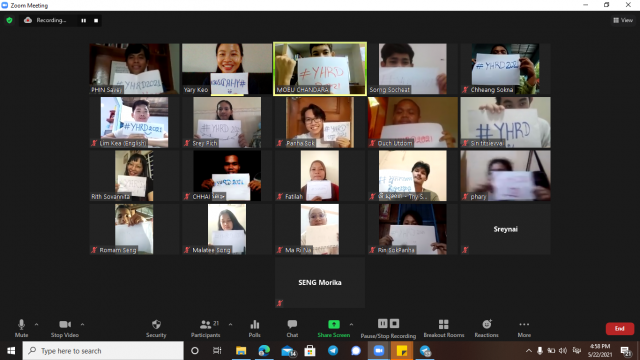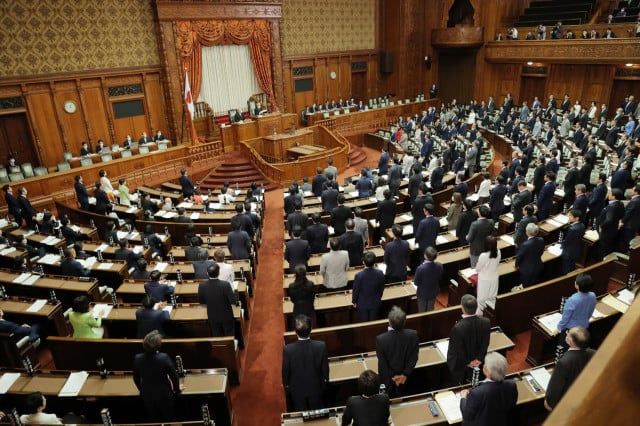Youth Aim to Combat Shrinking Civic Space in Cambodia

- Sao Phal Niseiy
- May 26, 2021 7:43 AM
Through training sessions, the Cambodia Youth Network has so far reached more than 180 young Cambodians and helped them to engage more in civil society amid a government crackdown.
PHNOM PENH--Human rights activism has been affected worldwide by increasing challenges due to shrinking civic spaces and Cambodia is no exception.
In response to this crackdown, the Cambodian Youth Network (CYN)—a local youth organization fighting injustice—is providing intensive training to support young human rights activists in an effort to expand youth-led activism and create more of a future for human rights defenders.
Thy Sopheap, a senior student of agricultural economics at Royal University of Agriculture, just completed the training course carried out by the CYN. Sopheap said that he wanted to build his understanding of human rights and know how to better defend them.
“I wanted to understand more about human rights as I hope to contribute to promoting [human rights] and making things better,” Sopheap said, pointing out that many people are still afraid to express themselves and their opinions due to the lack of knowledge of their own rights.
“Some wish to express their opinions on social issues but decide not to say anything because they don’t know how to do it without having to face repercussions,” he added.
“I am confident that I will share what I have learnt from the training with my friends and others so that they can understand their rights and duties,” Sopheap said. “As a youth, when I have more knowledge, I surely will have more ability to influence others.”
Having been enthusiastic about promoting human rights awareness, Sopheap believes that it is vital for every citizen to learn and expand their human rights knowledge regardless of their profession and age.
A trainer in the young human rights defender program, Phin Savey, who serves as resource mobilization, monitoring and evaluation coordinator at the Cambodian Human Rights and Development Association, said the program has been critical in creating more rights defenders who will be the backbone of healthy democratic development.
During the training, students will learn more about civic space and the obligation of state in protecting, respecting and fulfilling human rights.
“This program is meant to support the process of building new human resources in Cambodia’s human rights sector to promote human rights. They will be able to defend their own rights, the rights of the victims and the rights of their own respective communities,” Savey said.
“Whenever human rights are properly protected and respected and the rights defenders understand their own roles, the process of democratic development will also be better,” he added.
When asked what each participant can learn throughout the training, he explained that they are able to gain basic knowledge on the history of human rights concepts, their importance as well as the international and national human rights instruments, namely the International Covenant on Civil and Political Rights along with the International Covenant on Economic, Social and Cultural Rights.
Moreover, according to Savey, they are also able to comprehend the mechanism of the Human Rights Council, including the Universal Periodic Review and the complaint procedure.
“With this knowledge and expertise, they don’t need to be affiliated with any institutions in order to be a rights defender—they can defend their own rights, the rights of his or her family and the rights of their respective communities,” Savey stressed, adding that many participants have determined to make use of their knowledge as much as they possibly can to promote human rights in Cambodia.
Moeu Chandara, youth empowerment and advocacy coordinator at CYN, said that the training program for young human rights defenders began in 2015 and so far 186 youths—95 of whom are women—have been trained and have actively been promoting activism and advocacy in different sectors.
“Some of the participants work in the research sector; some join the public sector, some work with non-governmental organizations while some others transform themselves to be activists,” Chandara said, pointing out that many carry out direct and indirect activism on social media and engage in policy advocacy on the environment, natural resource management and human rights.
The positive thing about the program is that it not only empowers future human rights defenders, but equips them with a strong foundation of knowledge in human rights and the environment, which includes broader understanding of legal frameworks governing human rights, he explained.
“So, this can keep them safe and do their works better as a defender,” Chandara emphasized.
According to him, following the training, each participant who wishes to create initiatives to share knowledge or run human rights education programs, can also request for both financial and technical support.
This comes after eight international human rights NGOs issued a joint statement on May 25 requesting the government cease its assault on free speech in Cambodia. The statement pointed out that critical voices had been silenced through arrest and the fear of arrest, particularly in relation to criticism of the government’s COVID-19 response.
The rights groups also called on the government to stop intimidating those who dare to speak out against human rights abuses and noted that by warning people against criticizing them, the government was infringing on Cambodians’ basic freedoms.
“These actions are consistent with the government’s systematic and relentless crackdown on freedom of expression and information spanning far beyond the beginning of the COVID-19 pandemic,” the statement read. “This latest surge contributes to the government’s broader efforts to silence all critical voices in Cambodia.”
Phil Robertson, deputy Asia director of Human Rights Watch—one of the eight NGOs to sign the statement—said free speech and transparency are essential, particularly during the COVID-19 pandemic where accurate information can save lives.
The Cambodian government’s continued issuance of threats and warnings against civil society actors such as activists and journalists have damaged the authorities’ image even further, especially on the international stage, where Robertson feels more should be done to hold the government accountable.
“Sadly, while Cambodia violated freedom of expression and other rights during COVID-19 crisis, the UN and far too many of its agencies have been missing in action, remaining silent in the face of increased abuses,” he said. “When civil society are silenced, it falls to the international community to publicly speak up for rights, including through harsh condemnations against repression.
“As the statement of international NGOs released today shows, it’s time that the UN and foreign governments voice those concerns now.”















